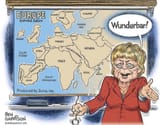Search Results
7/13/2025, 4:10:18 PM
7/10/2025, 2:07:02 PM
You will hate me for saying this but Russian multiculturalism is organically rooted in centuries of history, where Slavs are implicitly recognized as the majority at the same time as other ethnic minorities enjoy cultural autonomy within their communities.
Slavs are allowed to be proud and naturally ethnocentric. They are not allowed to call for a Slavic ethno-state. This would allow Neocons to push for the break up of Russia and integrate the smaller states within the global hegemony of American NFL liberalism.
Putin praises the contributions of non-Slavic groups in public speeches, and the multiethnic effort in World War II. However, Putin is not a civic nationalist who reduces Russian identity to universal liberal values.
He is a cultural nationalist who promotes a vision of Russian identity rooted in shared Slavic history, Orthodox Christianity, traditional values, and organic multiculturalism.
Slavs are not bombarded with anti-Slavic and anti-Christian messages.
While Putin supports minority cultures, Tatar language and history or the right of Muslim leaders to express their customs, his nationalism tends to be centered on Russian language, Orthodox Christianity, and a historical narrative that elevates Slavic contributions through figures like Peter the Great or Alexander Nevsky.
The concept of "Russkiy Mir" emphasizes cultural and linguistic ties across ethnicities, extending even to non-Slavic groups.
In contrast, multiculturalism in Western nations is a top down order created by liberals directly against European ancestral identities, with narratives focusing on historical guilt (colonialism, slavery).
Slavs are allowed to be proud and naturally ethnocentric. They are not allowed to call for a Slavic ethno-state. This would allow Neocons to push for the break up of Russia and integrate the smaller states within the global hegemony of American NFL liberalism.
Putin praises the contributions of non-Slavic groups in public speeches, and the multiethnic effort in World War II. However, Putin is not a civic nationalist who reduces Russian identity to universal liberal values.
He is a cultural nationalist who promotes a vision of Russian identity rooted in shared Slavic history, Orthodox Christianity, traditional values, and organic multiculturalism.
Slavs are not bombarded with anti-Slavic and anti-Christian messages.
While Putin supports minority cultures, Tatar language and history or the right of Muslim leaders to express their customs, his nationalism tends to be centered on Russian language, Orthodox Christianity, and a historical narrative that elevates Slavic contributions through figures like Peter the Great or Alexander Nevsky.
The concept of "Russkiy Mir" emphasizes cultural and linguistic ties across ethnicities, extending even to non-Slavic groups.
In contrast, multiculturalism in Western nations is a top down order created by liberals directly against European ancestral identities, with narratives focusing on historical guilt (colonialism, slavery).
Page 1

